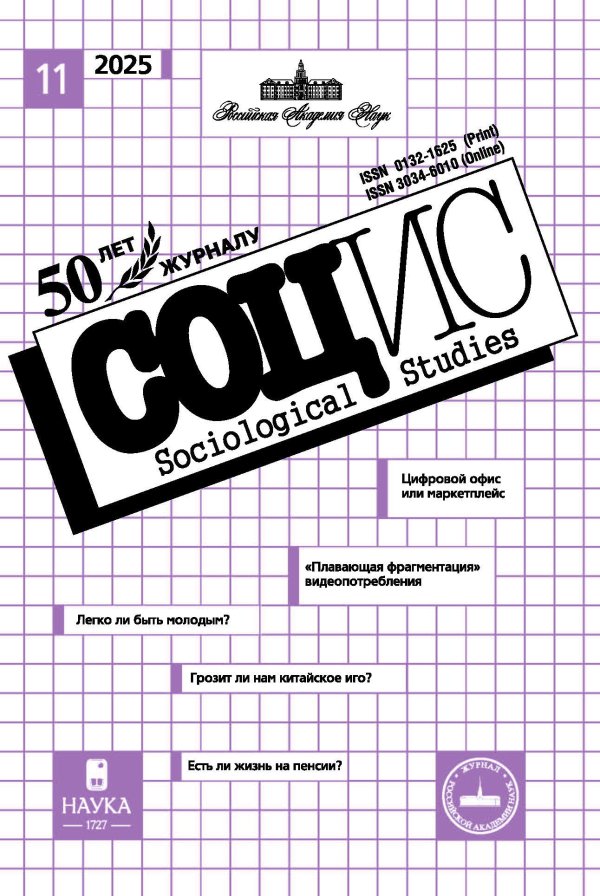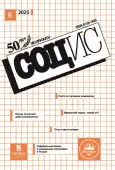British society reflected in the UK press during the pandemic
- Authors: Derkacheva M.V.1
-
Affiliations:
- Lomonosov MSU
- Issue: No 6 (2025)
- Pages: 28-36
- Section: SOCIOLOGY OF MASS COMMUNICATIONS
- URL: https://bakhtiniada.ru/0132-1625/article/view/304503
- DOI: https://doi.org/10.31857/S0132162525060031
- ID: 304503
Abstract
Being a living language, the language of the media actively responds to and reflects processes occurring in a society. As the COVID-19 pandemic has been a big crisis for humanity in the 21st century, it is extremely interesting and crucial to identify changes and trends in media language of the time and make parallels to patterns and shifts of social character evolving during the pandemic. The study is based on quantitative and qualitative content analysis of British press within the framework of the COVID-19 pandemic. The period was split into four time spans, the author created and applied to each of the periods four dictionaries with lexical units semantically related to social challenges and processes taking place in the UK during the pandemic. The study shows how social problems of the time such as discrimination against Asians, medical personnel and other key workers as well as restrictions of human rights and freedoms were reflected in media language. The results also reveal that in the early days of the pandemic an increase in anxiety and panic was traced through a large number of negative messages conveyed by press. But during the peak of the first wave in Britain the degree of negativity in the studied media texts drops together with the level of mental health issues of British young adults. Further findings show that it was achieved through intensive militarization of the language which raised the level of resilience of the nation.
Full Text
About the authors
Maria V. Derkacheva
Lomonosov MSU
Author for correspondence.
Email: derkacheva.maria@lecturer.msu.ru
Lecturer at the Department of Journalism
Russian Federation, MoscowReferences
- British Academy. (2021) The COVID Decade: Understanding the Long-Term Societal Impacts of COVID-19. London: The British Academy. DOI: 10.5871/ bac19stf/9780856726583.001.
- Browning Ch., Haigh J. (2022) Hierarchies of Heroism: Captain Tom, Spitfires and the Limits of Militarized Vicarious Resilience during the COVID-19 Pandemic. Global Studies Quarterly. Vol. 2. No. 3: 1–13.
- Dadueva S. (2024) Typology of Military Metaphors in the English-Language COVID-19 Discourse. Filologicheskie nauki. Voprosy teorii i praktiki [Philology. Theory & Practice]. No. 5: 1705–1712. (In Russ.)
- Egorova E. V., Krasheninnikova E. I., Krasheninnikova N. A. (2021). Neologisms of COVID Era. Aktual’nye problemy filologii i pedagogicheskoj lingvistiki [Current Issues in Philology and Pedagogical Linguistics]. No. 4: 207–216. (In Russ.)
- Gagne T., Schoon I. et al. (2022) Mental distress among young adults in Great Britain: long-term trends and early changes during the COVID-19 pandemic. Social Psychiatry and Psychiatric Epidemiology. No. 57: 1261–1272.
- Gram L., Mau A. (2024) ‘We are not the Virus’– Experiences of Racism Among East & Southeast Asian Heritage Young People in London during the Height of the COVID-19 pandemic. PLOS Glob Public Health. Vol. 4. No. 1: e0002016.
- Haigh J. J.B. (2020) Vicarious Militarism: Ontological (In)Security and the Politics of Vicarious Subjectivity in British War Commemoration. PhD Thesis. University of Warwick.
- Kupina N. A. (2022) Coronavirus Pandemic: Metaphorical Diagnostics of an Alarming Reality in Media Texts. Ural’skij filologicheskij vestnik № 2. Ser.: Yazyk. Sistema. Lichnost’: Lingvistika kreativa [Ural Philological Bulletin. No. 2. Ser.: Language. System. Personality: Linguistics of creativity]. No. 31: 5–13. (In Russ.)
- Malakhova S. (2021) Metaphoric Representation of the Coronavirus Pandemic in the English Discourse. Izvestiya Volgogradskogo gos. ped. un-ta [Herald of the Volgograd State Pedagogical University]. No. 9(162): 149–152. (In Russ.)
- Polonskaya O. (2023) Military Metaphors of the COVID-19 Pandemic in the Anglophone Media Texts. Sovremennaya kommunikativistika [Modern Communication Studies]. No. 3: 26–31. (In Russ.)
- Prokofieva N., Shcheglova E. (2021) Current key word ‘coronavirus’ in memes: semantics and pragmatics of use. Mediaskop [Mediascope]. No. 2. doi: 10.30547/mediascope.2.2021.8. (In Russ.)
- Redkozubova E. A. (2020) COVID-Vocabulary: Etymology and Word-Formation (based on Russian, English, German). Gumanitarnye i social’nye nauki [The Humanities and Social Sciences]. No. 4: 193–200. (In Russ.)
- Severskaya O. (2020) Covidiots on Coronacation: Coronaviral Lexicon as a Diagnostic Field for Actual Discoursive Practices. Kommunikativnye issledovaniya [Communication Studies]. Vol. 7. No. 4: 887– 906. (In Russ.)
- Shemchuk Yu. (2020) Lexical Changes in the German Language Under the Influence of the Coronavirus Pandemic (On the Examples of Neologisms of Sports Topics). Mir nauki, kul’tury, obrazovaniya [The world of Science, Culture And Education]. No. 4(83): 498–499. (In Russ.)
- Shukunda S. (2020) “Covidols” versus “covidiots”: English Neologisms Generated by the Coronavirus. Filologicheskij aspekt [Philological Aspect]. No. 04 (60): 119–125. (In Russ).
- Sizykh M. (2020) Military Metaphor in the Reception of COVID-19 (Based on the Material of Modern Russian Media Discourse). Filologicheskij aspekt [Philological Aspect]. No. 05(61): 7–14. (In Russ.)
- Szczepański J. (1969) Elementarnye ponyatiya sociologii [Elementary Conceptions of Sociology]. Moscow: Progress. (In Russ.)
- Taylor E. (2022) Violence Against Shop Workers: Trends and Triggers in the United Kingdom. In: The Handbook of Security. Ed. by M. Gill. Palgrave Macmillan, Cham.
- Yakovleva E.B. (2021) From Family to Coronavirus: Military Metaphor in Different Types of Discourse. Social’nye i gumanitarnye nauki. otechestvennaya i zarubezhnaya literatura. Ser. 6. Yazykoznanie [Social Sciences and Humanities. Domestic and foreign literature. Ser. 6. Linguistics]. No. 1: 141–153. doi: 10.31249/ling/2021.01.09. (In Russ.)
- Zamaldinov V. E., Horiguchi D. (2021) “Coronavirus” Innovations in Media Language and Internet Communication. Vestnik Volgogradskogo gosun-ta. Ser. 2. Yazykoznanie [Bulletin of Volgograd State University. Ser. 2. Linguistics]. Vol. 20. No. 5: 141–152. (In Russ.)










